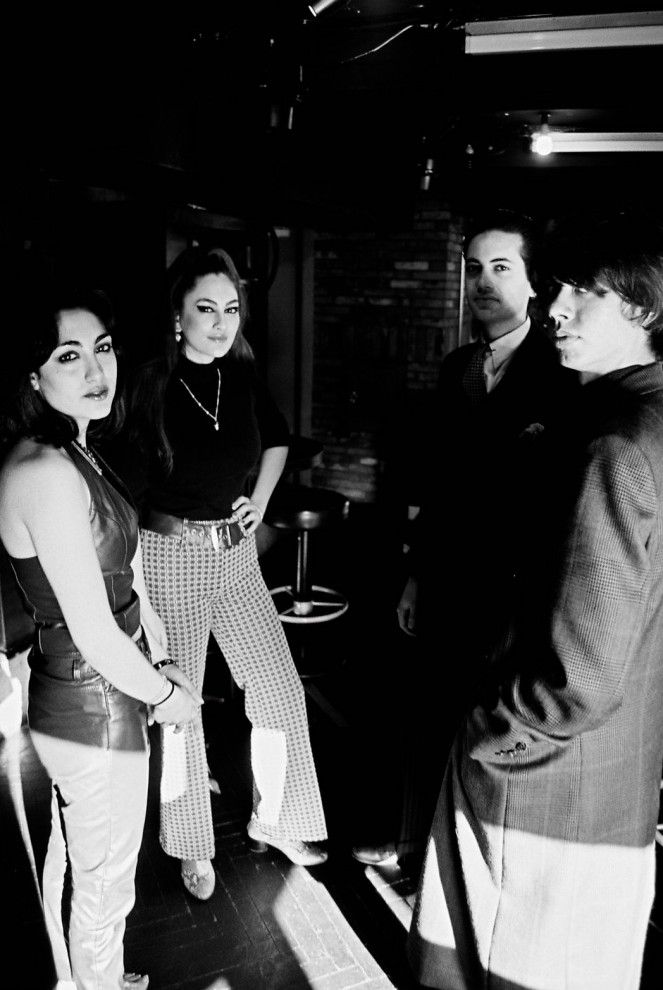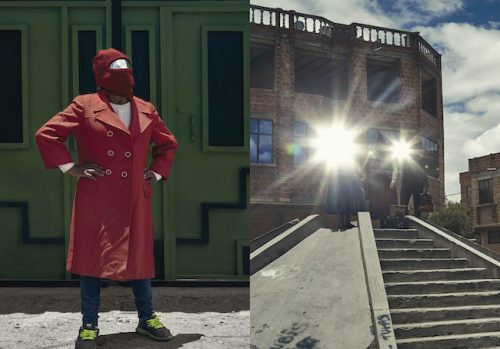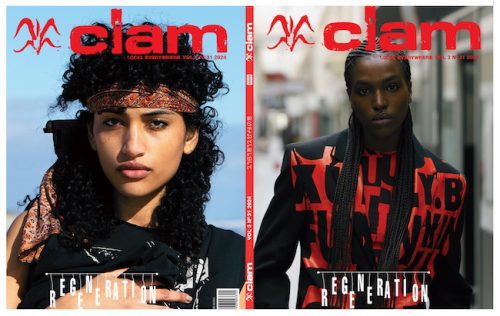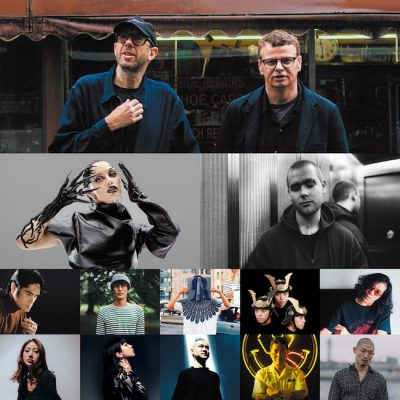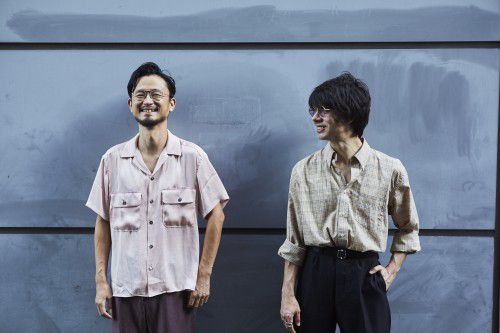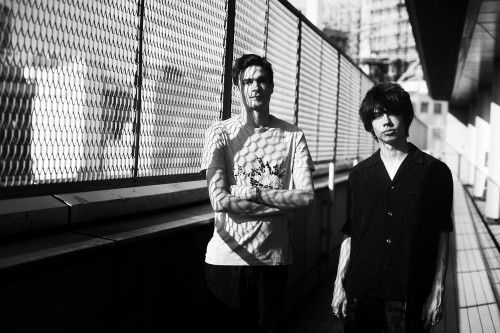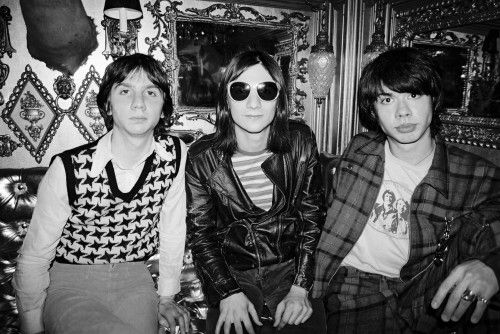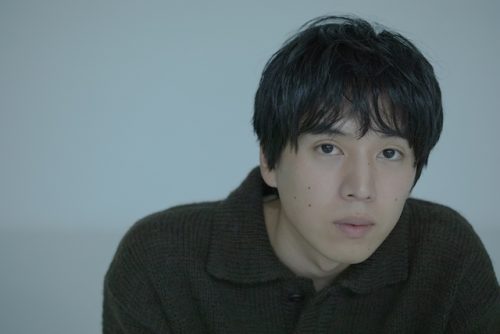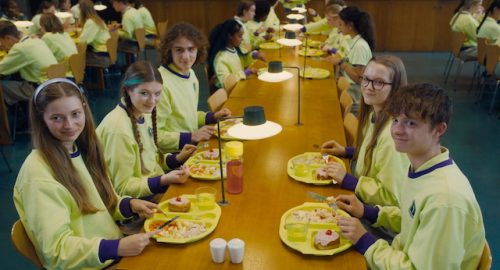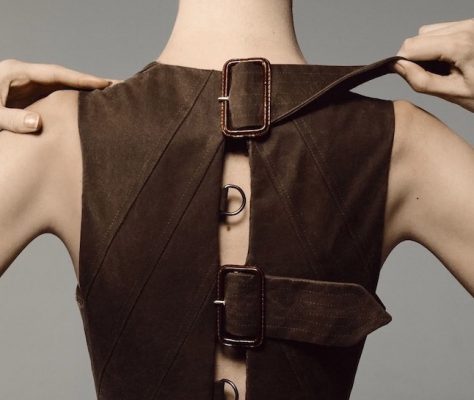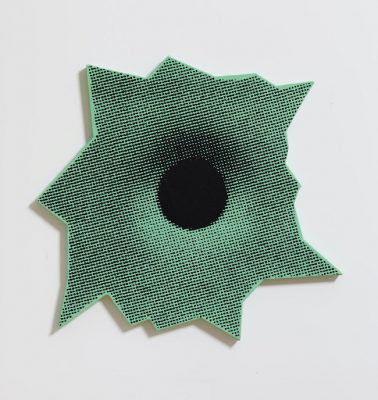OKAMOTO’Sのメンバーが友人はもちろん、憧れのアーティストなどをゲストに迎える対談企画第22弾。オカモトショウがホストを務める今回は、同じブルースというルーツをもちながら、ニューアルバム『SUPERSCOPE』にてモダンな側面を打ち出したKitty , Daisy & Lewisを迎え、古き良き時代の音楽を愛しつつも革新を求めるミュージシャンの姿勢について語りあった。
Sho「日本でプレイするのは今回で何度目ですか?」
Kitty「6、7回目かな」
Daisy「日本のフェスが大好きでよく来てるからね」
Sho「イギリスでは自分たちの車でツアーを回ってるんですか?」
Lewis「UKではあまりやらないけど、ヨーロッパではそうしてるよ。ここ2回のツアーではツアーバスを使った。そっちの方が安いからね。じゃないと、どの都市でも毎晩ホテルに泊まらないといけなくて大変なんだ」
Kitty「ギグをやって、バスに乗って、寝て起きたら次の街にいるって感じ」
Lewis「僕たちにはバスが合っているんだ。会場から撤収して、バスに乗ってすぐ出れる(笑)。それで生活のサイクルが出来るしさ。夜ご飯を食べて、ショーをやって、寝て、朝食を食べて。それを毎日こなせばいい」
Daisy「バスを使う前は、霊柩車を使っていたのよ。ダブルベースやキーボードを運ぶのにちょうど良かったのよね(笑)。まだその車も持っているわ」
Sho「クールですね(笑)。僕たちのバスでは、誰がどこに座るかが決まっているのですが、みなさんはどうですか?」
Lewis「席順は気にしない。でも、ママとツアーマネージャーはいつも最前に座ってるな(笑)」
Sho「(笑)。実は僕の父親もジャズ・ミュージシャンで、よくヨーロッパをツアーしています。彼は70年代にデビューして、当時はフュージョンの時代でしたが、スウィングジャズなんかを演奏していて。若者が当時古いジャズをプレイするということはレアだったようですが、ベン・ウェブスターや、レスター・ヤングなど、そんな感じのジャズをやっていました」
Lewis「僕が好きなミュージシャンたちだ!」
Sho「僕も父親からそういうミュージシャンたちを教えてもらって、好きになりました。最初はジャズから入りましたが、ヒップホップを聴く世代だったのでエミネムなんかも聴いていて(笑)。その後、マディ・ウォーターやリトル・リチャードのような古いブルースを聴くようになって、それからローリング・ストーンズを知りました。彼らの1stアルバムはブルースのカバーがメインだったこともありクールだと感じたし、その流れでどんどんロックバンドにハマっていって」
Lewis「わかるなあ。僕らのトランペット奏者のタンタンは、ローリング・ストーンズのレコードで演奏していたことがあるから、彼らを知ってるんだよ。なんと言っても、彼が初めて見た破れたジーンズを履いている人が、ブライアン・ジョーンズだったんだ(笑)。彼は以前はR&Bやジャズをプレイしていて、よくソーホーに出没してはジャズクラブなんかで演奏していたんだって」
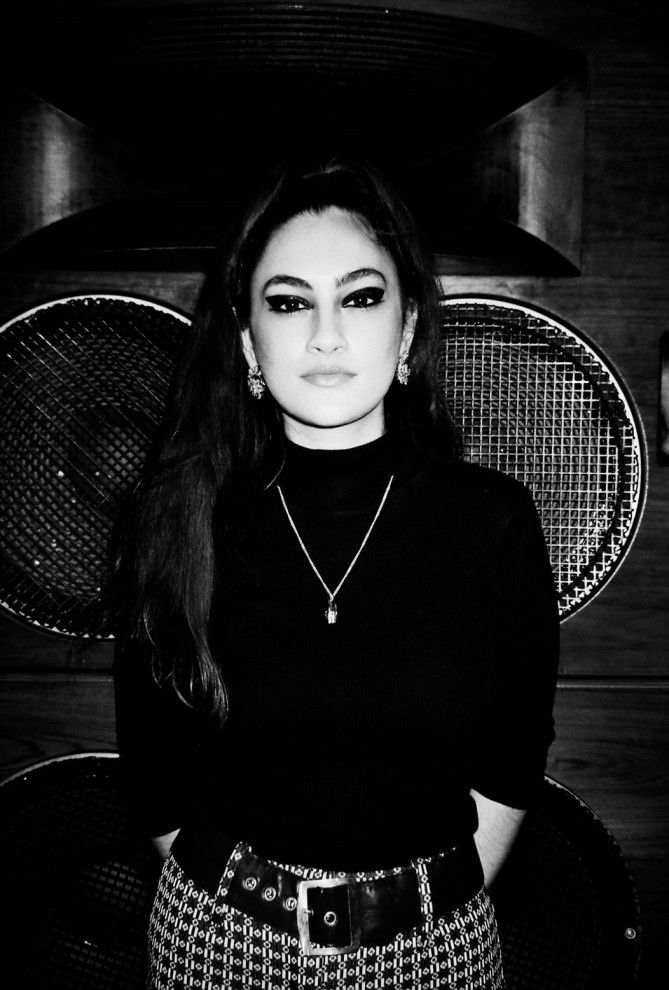
Sho「すごい! 羨ましい。あなたたちのアルバムを初めて聴いた時、すごい衝撃を受けました。僕もブルースが大好きで、高校の時はブルースをよくカバーしていて。なので同じくらいの年齢で、同じことをやっている人たちがいることを発見してすごくクールだと思いました。特に1stアルバムの最初の曲“Going Up The Counrty”が好きです。シタールのようなサウンドが聴こえてきて。サウンドは50年代っぽいけど、シタールは60年代のロックバンドがよく使っているものなので珍しい組み合わせだと思いました。サウンドはロカビリーなのにサイケデリックの楽器が使われているというギャップが面白かったんです」
Lewis「ありがとう。あれは何か上に必要だと思ったから、後で加えたんだ。曲を聴いて、オープンコードで合わせたんだよ。ギターが始まると、シタールがさらなる層を作り出すんだ。でもこれに気づいた人は君が初めてだよ」
Kitty「ビデオにも映ってるのにね。ニューアルバムの“Down On My Knees”でもシタールが使われているのよ」
Lewis「あの曲はテープにダブルスピードでレコーディングした。テープを普通のスピードでプレイすると、サウンドが低くなる。だから、シタールとはあまりわからないんだよね。まるでドローンみたいに聴こえる」
Sho「なるほど。ということは、オープンリールのテープマシンを使っているんですか?」
Daisy「そうよ」
Sho「僕たちも前のアルバムで使って、色々トリックを試したんです。声をダブルスピードにして高くしたり。コンピュータ上でもできますが、それだとデジタル・ノイズが入ってしまう。なので、敢えてテープでレコーディングして、少し変わった歌声を作りたくて。すごく楽しい体験でした」
Lewis「テープマシンは色々なことが出来るよね」
Sho「ええ、本当に。1stのレコーディングはどんな感じでしたか?」
Lewis「最初のレコードは、文字どおり部屋に全員で入って、マイクに向かって順番にプレイしていただけだったな。後からシタールは加えたけど(笑)」
Sho「それじゃ、別々にレコーディングしたということですか?」
Lewis「多くはそうだったね。3回くらいやり直したものもあるけど、ちゃんと納得いくまでやることで最後は報われるんだ。2ヶ月くらいかかったかな」
Sho「そのレコーディング方法にしては短いですね」
Lewis「そうだね。僕たちは曲を書くのがはやいし、プロダクションも良い意味でシンプルで、全てが詰まっていながらも複雑すぎないんだよ」
Sho「なるほど。今回が初のセルフ・プロデュース作品になるんですか?」
Lewis「いや、ミック・ジョーンズがいた3枚目以外は全部セルフだよ。でも彼は曲が全て出来上がった時点で参加してくれたんだ。だから、僕たちを管理したり、意見を押し付けたりってことはなかったね」
Sho「とはいえ、サウンドエンジニアはいますよね?」
Daisy「それも自分たちでやってる。機材も何もない状態から自分たちで組み立てたの」
Sho「すごい!どこで学んだんですか?」
Lewis「わからないな。人と話したり、作業しているのを見たり、あとは本を読んだりして。15歳くらいから始めたんだ」
Sho「コンピュータを使ってではなく、本格的なコンソールを使って?」
Lewis「電子機器は一切使ってないよ」
Sho「素晴らしい。いつか自分も出来たらと思っていますが、始めるチャンスがまずないだろうな(笑)」
Daisy 「ルイスは私の2つ下の学年だったんだけど、学校で先生に、『ルイスが部屋に来て、電話を解体してまた組み立て直して出て行った』って言われたのを覚えてるわ」
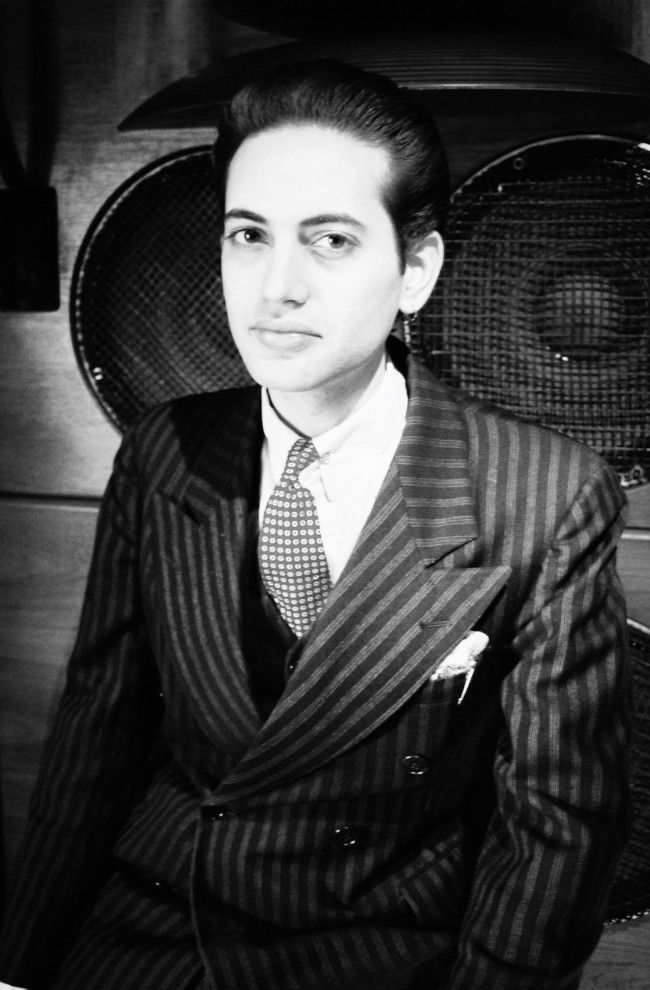
Sho「機械の解体も修理も出来るなんて(笑)。全員が楽曲を作っているんですよね?」
Kitty「そう。だから自分たち自身も毎回レコードがどんな出来になるのか、どんなサウンドになるのかわからないのよ。どんな曲が出来上がるのかもね。というのも、私たちは一人一人バラバラに曲を作るの。一緒に作ることはほぼゼロ。アルバムを作ると決まってから、集まってそれぞれが書いたものを見せ合うの。そこからそのアイデアを発展させたり、アレンジしたりする。だから最初はその曲がどうなるか、どんなヴァイブスを持つかなんて私たち自身にもわからないというわけ」
Sho「個々に作った楽曲は、携帯に保存して聴かせるんですか?」
Lewis「大抵は携帯のボイスメモだね。それか譜面にする」
Daisy「どこでもいつでも思いついた時にアイデアを保存出来るから便利なのよね。私の携帯には『んんん~』って歌っているものが沢山レコーディングされているわ(笑)」
Sho「僕もよくやります(笑)。でもボイスメモだと、そのアイデアの持ち主が何をやろうとしているのかを読み取るのが大変じゃないですか?」
Daisy「アイデアを披露し合う時は、スタジオに入って演奏するのよ。だから、お互いに自分たちがレコーディングしたものは聴かせないの」
Lewis「自分が何を思いついたかを理解してもらえない時以外はね。その時は、元々のアイデアを聴かせる。そうすると、『ああ、なるほど。このヴァイブスか』ってわかってもらえる時もあるから」
Sho「ということは、それぞれでデモを作ったりもしないんですね。僕の場合はメンバーが、僕がやろうとしていることをわかってくれない時に備えて、デモを作ることから始めていて(笑)」
Lewis「(笑)。でも完全にわかってもらえないことが逆に良い時もあるよね。『これを演奏してみてくれる?』と頼んで、誰かが自分の想像と全然違うものをプレイしても、『想像してなかったけど、こっちの方が実は良いかもな』と思うこともある」
Sho「確かに。それは誰かと一緒に曲を作ることの醍醐味でもありますね」」
Daisy「自分のオリジナルのアイデアと違っていても、曲に機能するものであれば何でもアリ。機能することが大切なの」
Sho「以前はメンバーに自分のアイデアがわかってもらえないと歯がゆかった時期もありました」
Lewis「スタジオにいて、自分が求めているものを得られなかったり、それを演奏できないのはかなりのストレスになるよね。イライラするしさ。それがスタジオってもの。だからみんないつも泣いてるだろ?(笑)」
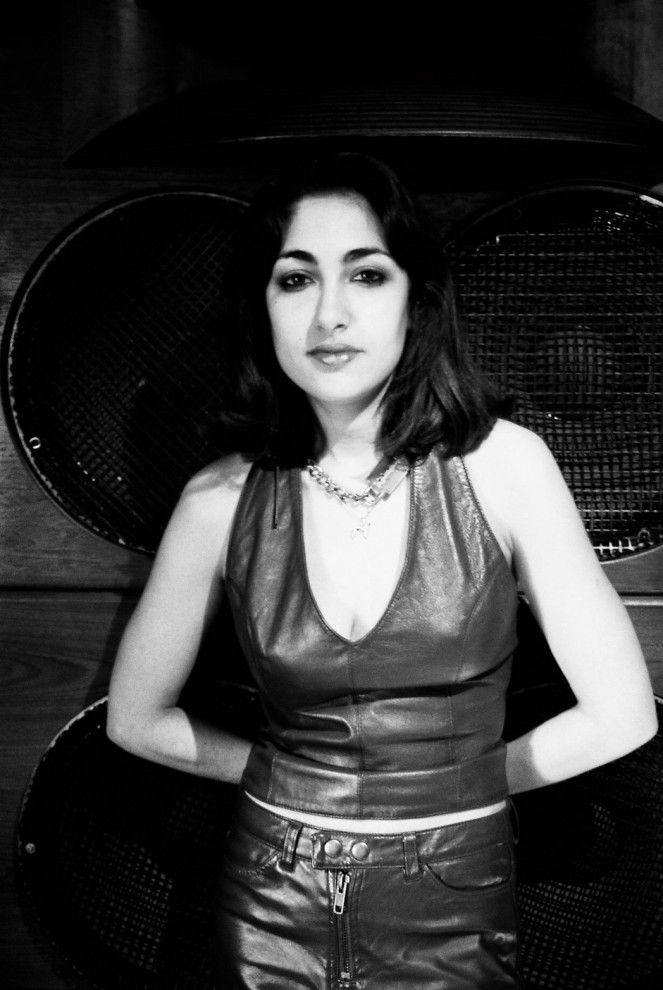
Sho「(笑)。ところで、ニューアルバムは最高でした。すごくクールでしたが、以前のサウンドとかなり違っていたので驚きました。今回はもっとモダンでフレッシュですね」
Kitty「1stアルバムは10年前にリリースされたの。それを考えると、アルバムを作っている当時、私は12歳とかそれくらいだったわけよね。そんなに若い頃といまではサウンドもやっぱり変わるわ。成長する過程で、自分自身も変化するし進化する。自分の音楽のテイストも、スキルもね。ニューアルバムには私たちの今が反映されているの。最初のレコードは主にカバーだったけど、今は自分たちの曲を書くし、前とは全く違うのよ」
Lewis「レコーディングには同じ機材が使われていて、違うのはアプローチだけなんだけどね。変わったのは、同じレコードを作りたくなかったからだと思う。人の反応を気にしてではなく、自分たちのためにね。前のようなサウンドにしたくないから敢えてこうしようと話し合ったわけじゃなく、自然に作っていくうちに『このサウンドだな』と感じられたんだ。そうやって出来上がってレコーディングしても、ライヴで変わっていく曲もある。ビートが違ったりね」
Daisy「”Going Up The Country”なんて全然違う」
Lewis「あの曲をレコーディングした時は、僕たちはオリジナルを聴いたことがなかったんだ。父親がギターで演奏しながら歌っていたのを聴いたことがあるだけだったんだよ。その僕たちヴァージョンをレコーディングしたんだけど、Canned Heatのオリジナルを初めて聴いた時は、みんなで『やばい!僕たち完全に間違ってる!』って思った(笑)。それも面白いけどさ」
Daisy&Kitty「ははは(笑)」
Sho「すごくいい話ですね。面白いと思ったのは、僕たちのバンドも前は古き良きロックンロールが大好きで、新鮮に感じていたのに、2017年にリリースされた最新作ではもっとモダンな方向に進んだ。正直なぜそうなったかはわかりませんが、過去ではなく、今を生きるバンドでありたかった。だからこそサウンドや姿勢、イメージを変えるチャレンジをして。完全に変えたわけではないし、僕たちの音楽の要素はもちろん保ったままですけど。あなたたちのアルバムからは、それと同じ変化を感じました」
Lewis「音楽家ならみんなが進む道だと思うよ。自然とそうなるんだ。ずっと同じではいれないからね。演奏だって変わる。もし同じだとしたら、それはフェイクだよ」
Kitty「自分が正しいと感じることをやるべきよ。それをやって、良い気分ならやればいい。他の人たちがどう思うかなんて心配しなくていいの。もちろん、時には観客を楽しませることを考えなければいけない。でも、全てを他人のためにやるのは不可能。エンジョイできないなら音楽を作っている意味がないしね」
Sho「本当にそうですね。僕らも楽しんで進んでいきたいと思います」
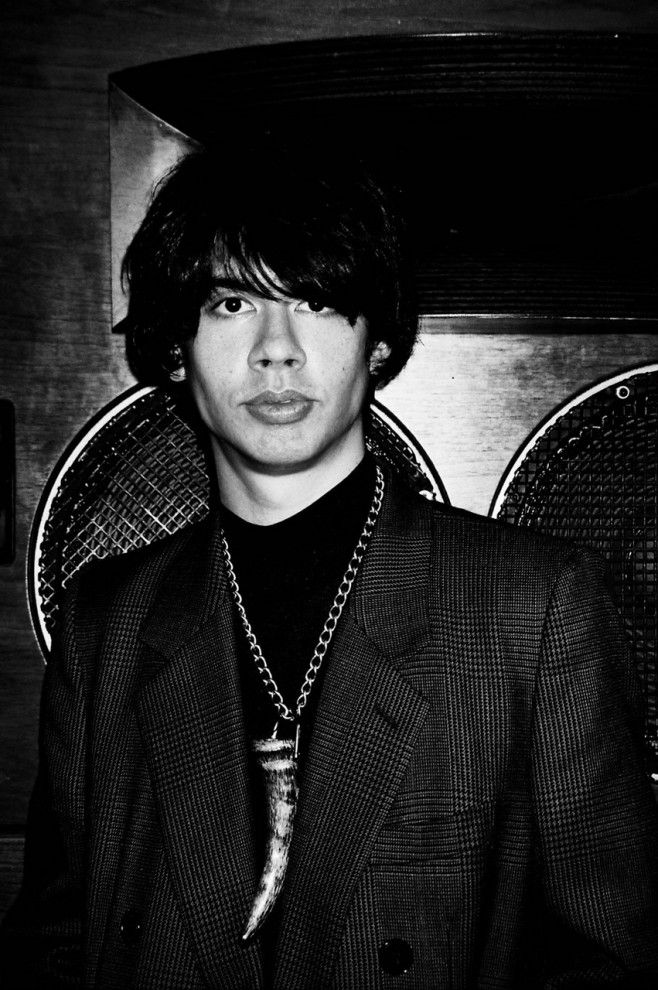
photography Riku Ikeya
interview & edit Ryoko Kuwahara
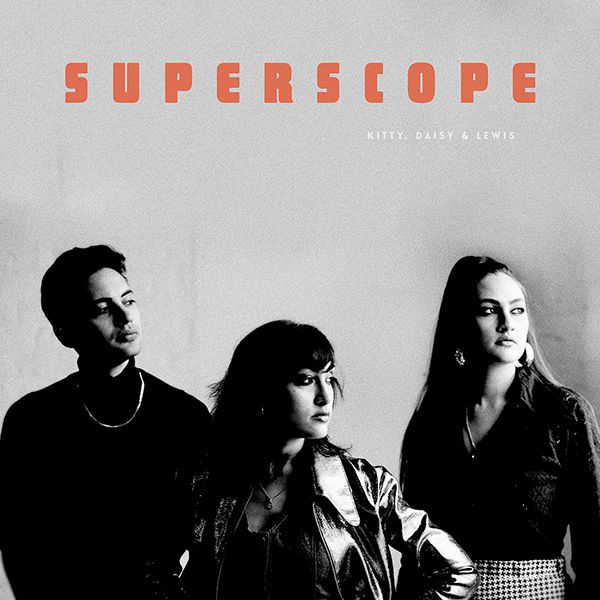
KITTY , DAISY & LEWIS
『SUPERSCOPE』
(SUNDAY BEST / BEAT RECORDS)
発売中
国内盤特典:ボーナストラック追加収録 / 歌詞対訳+解説書封入
beatink: https://www.beatink.com/products/detail.php?product_id=9216
amazon: http://amzn.asia/3X86I8v
tower records: http://tower.jp/item/4555862/SUPERSCOPE
hmv: http://bit.ly/2tYvaPk
iTunes: http://apple.co/2tPYsNf
KITTY , DAISY & LEWIS
長女のデイジー、次女のキティ、長男のルイスで結成されたロンドン生まれの3兄弟によるロックンロールバンド。アイランドレコーズ等でマスタリング・エンジニアとして30年以上数多くの音楽に関わってきた父グラッツ・ダーハムと、伝説の元祖ガールズ・ポストパンク・バンドのレインコーツのメンバーであるイングリッド・ウェイスを母に持つ生粋の音楽一家に生まれる。幼い頃からヴィンテージの楽器に囲まれて育った彼等は、3人揃ってマルチ楽器奏者のソングライターで、曲によってヴォーカルや楽器を持ち替えている。2008年に徹底的にデジタルを排除し、アナログ機材だけを使用した1stアルバム『Kitty, Daisy & Lewis』をリリース。音楽専門誌のみならずファッション誌をはじめとする各種メディアから大きな称賛を集め、エイミー・ワインハウス、コールドプレイから、デヴィッド・リンチ、ダスティン・ホフマンといったセレブリティにまで愛される存在となる。2009年にはコールドプレイからラブコールを受けUSツアーをサポート。2011年には2ndアルバム『Smoking in Heaven』をリリース。そして2014年夏に、かつてからファンと公言していた元ザ・クラッシュのミック・ジョーンズをプロデューサーに迎えてスタジオ入りし、翌年の頭に3rd『Kitty, Daisy & Lewis The Third』をリリースし、そのアルバムを引っさげて春に行われた初のツアーは全公演ソールドアウト。そして秋には、かねてからファンと公言していたEgo-Wrappinとの対バンツアーも全公演ソールドアウトに。2017年9月には待望の新作『SUPERSCOPE』をリリース、2018年1月に約2年振りの来日を果たした。今回の新作も作詞作曲、プロデュースのみならず、エンジニアリングに至るまで、すべてを自分たち自身で行い、アナログに徹底的にこだわって制作されている。さらに磨きのかかったソング・ライティング・スキルによって生み出された楽曲は、かつてないほどエネルギッシュで、エモーショナル。彼らにしかないポップ・センスが注入されたソウル、ブルース、ロックンロールが、驚くほどフレッシュに鳴り響く傑作となっている。
http://www.kittydaisyandlewis.com
OKAMOTO’S
オカモトショウ(Vo)、オカモトコウキ(G)、ハマ・オカモト(B)、オカモトレイジ(Dr)。2010年5月にアルバム 『10’S』、11月に『オカモトズに夢中』、2011年9月に『欲望』を発売。2013年1月に4thアルバム『OKAMOTO’S』を発売し、7月に は両A面シングル“JOY JOY JOY/告白”を、11月6日にニューシングル“SEXY BODY”をリリース。2014年1月15日に岸田繁(くるり)を迎えた5th アルバム『Let It V』を、8月27日にはRIP SLYME、奥田民生、黒猫チェルシー、東京スカパラダイスオーケストラ、ROY(THE BAWDIES)らとコラボを果たした5.5 thアルバム『VXV』を発売。2015年9月30日、6thアルバム『OPERA』をリリース。2016年6月1日にNetflixドラマ「火花」の主題歌「BROTHER」を表題曲にしたシングルをリリース。10月29日、東京・日比谷野外大音楽堂公演にてキャリア初の47都道府県ツアーファイナルを敢行。同ツアーからの厳選音源と、ツアー中に書き下ろした新曲「ROCKY」を収録し、ツアーファイナルの映像を全曲収録したBlu-ray付きライヴアルバム『LIVE』を2017年5月31日にリリース。8月2日に7thアルバム『NO MORE MUSIC』をリリース。同年10月7日には中野サンプラザにてキャリア初のホールワンマンの開催を発表し、即完売となる。同月30日より恵比寿リキッドルームを皮切りに全国23か所を回るツアー「OKAMOTO’S TOUR 2017-2018 NO MORE MUSIC」を実施。ファイナルとなるZepp Tokyoも完売となる中、オカモトショウのソロツアーが4月よりスタート。
http://www.okamotos.net
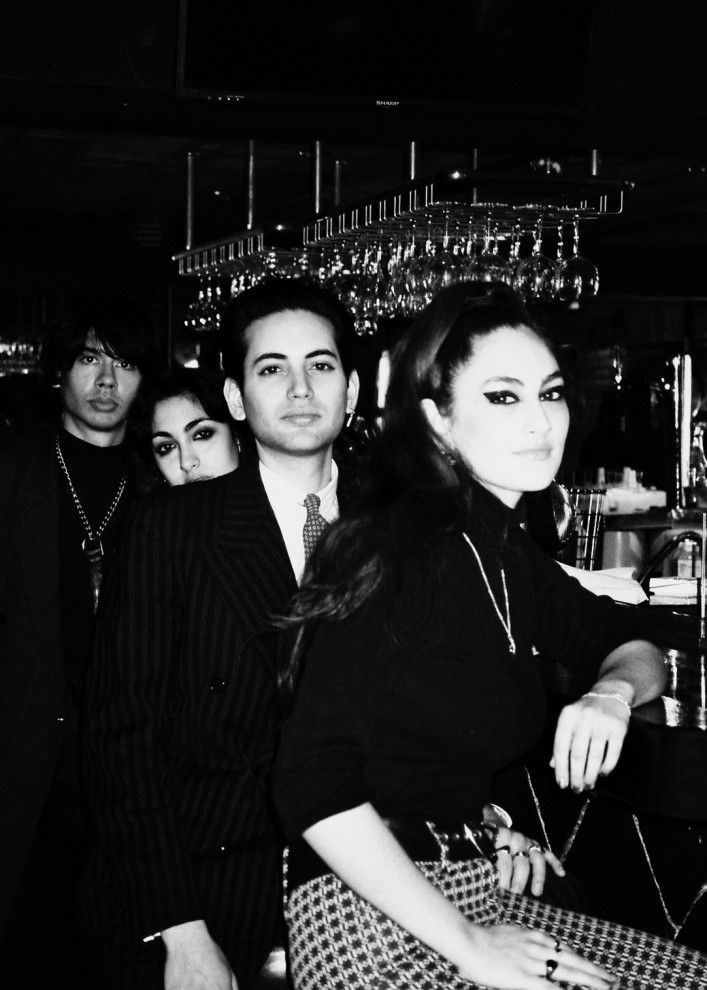
Sho: It’s really pleasure to meet you guys.
KDL: You, too!
Sho: I heard your first album when I was that age so it was pretty shocking. Like, “What is this!?” I used to like Blues we used to cover blues numbers when we were in high school. So when I discovered that there are some people who are doing the same thing, it was pretty cool. And I liked the first song on the first album. I heard some Sitar kinda sound.
Lewis: Yeah, “Going Up The Country”.
Sho: Yeah. The sound was like the 50’s sound but sitar is supposed to be the 60’s right? People used to use them in rock bands in the 60’s.
Lewis: Psychedelic time. Haha.
Sho: So it was like rockabilly with psychedelic instrument. I thought it was interesting.
Lewis: I think we just added that after because we need something there. So we just listened to the song and tuned it open chord. So when the guitar starts, it gives extra level.
Sho: That was pretty amazing.
Lewis: Oh, thanks. Anyone else noticed that.
Daisy: No. No one’s ever said anything.
Kitty: You can see it in the video as well. There’re some sitar on the new album as well. Songs like “Down On My Knees”.
Lewis: It was recorded double speed on the tape.When play the tape normal, it goes really low, so it doesn’t sound like sitar much anymore. It sounds almost like drone.
Sho: I see. So you guys use the open reel tape machine?
Daisy: Yeah.
Sho: We used that on the last album when we tried a lot of tricks on it. You know, like, you can make the voice double speed faster high sound on computer now, but you get some digital noise on it if you use a computer. So we wanted to try it on tape to make the strange singing voice. It’s pretty fun.
Lewis: Lots of stuff you can do.
Sho: Yeah. And your new album was really great. It was really cool. And it surprised me because the sound was pretty different to your previous sound. It was more modern and newer.
Kitty: First album was released 10 years ago. So when you think back to that, I was about 12 or something. I imagine it sounded completely different when you were that young as well (laughs). So you know, as you grow up, obviously you change and develop, and your musical taste and skill change. So that’s kind of we’re doing now. And also, the first record was mainly covers. But now we write our own stuff. So it’s different.
Lewis: It was all recorded on pretty much the same equipment. Just different approach. So the first one was literally just all of us in the room with microphones and playing. That was it. And added the sitar (laughs). But the latest one was like, on some tracks, you did the drums first or something like that.
Sho: Really. So was it separated?
Lewis: Quite a lot actually. Some songs we recorded like three times. We recorded once and like, “yeah, it’s a good take” but we left and come back and listened to it again, and was like “no we have to redo it”. So which paid off in the end.
Sho: Did it take long?
Lewis: About two months really.
Sho: That’s pretty short for it.
Lewis: Yeah. We write really quickly. And the production is quite simple as well. But not in a bad way. To me, it sill all there, you know.
Sho: Is that your first self-produced record?
Lewis: No. They’ve all been self-produced apart from the third. Cause we had Mick Jones there as well. But again, he kind of came in the stage the songs were already written. So he did’t administer or forced us to do something.
Sho: But there was a sound engineer right?
Daisy: No. We did it. And we built the equipment as well from the scratch.
Sho: Wow. How did you learn that?
Lewis: Ah, just.. don’t know. We used to talk to people and watch people do it, and read books. Like that.
Sho: When did you start engineering?
Lewis: When I was a teenager probably. And maybe when I was like 15.
Sho: With the real console? Not only on computer right?
Lewis: No no. Not electric at all.
Sho: Wow. That’s amazing. I wish I could do that someday. But there’s no chance for me to start (laughs).
Lewis: Yeah, it’s not very social thing (laughs).
Daisy: I remember when I was at school, Lewis is two years younger than me, and my teacher said “Oh Lewis came in and took the telephone apart. But got them back together again”.
Sho: So you can break and fix machines (laughs). You guys told me the first album came out 10 years ago. And people change in 10 years. I understand. But is there any reason you guys went to more modern style sound for the newest album?
Lewis: I think we never wanna make a record which sounds another one. Because not for other people’s sake but for our sake. So people naturally start listening different style all the time. I guess it was just what was going on at the time and it came out. It wasn’t like, oh, we don’t want it to sound like that” but it was just we were making tracks and it’s suddenly done and like, “Ok. This is the sound”, you know.
Kitty: We also don’t know how the record’s gonna turn out or how it’s gonna sound, and how the songs gonna be because we all write individually. We really never write together. So when we come to make an album together, we sit down and show each other songs we’ve written. And then we develop and arrange and work form there together. So initially we don’t know what the songs are gonna be and what kind of vibes the record would have.
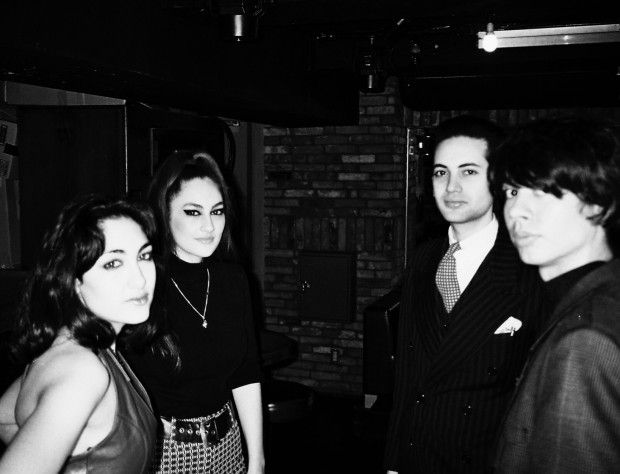
Sho: At the first point, are the songs you write individually on your phones? Or tapes? Or you just play and sing?
Lewis : Usually on my voice memo. Or we write it down.
Daisy: I’ve got loads go recording on my phone singing like “Mmmm” (laughs).
Sho: Same as me. I do that too (laughs).
Daisy: That’s handy because you can be out anywhere and anytime the idea comes to your head just sing it and keep it.
Sho: Is it hard to understand what the others tried to do with the voice memo?
Daisy: We don’t listen to each other’s. Anytime we listen to each other’s songs, we get into the studio and show each other, like play it. So we don’t show each other when we’re recording.
Lewis: Only unless when people don’t understand what your trying to do there. Then you show the idea and they go like, “ah ok. I get the vibes”.
Sho: So you guys don’t make demos individually? You have your ideas just in your head?
Kitty: Sometimes. I do sometimes for myself. Just when I’m writing and I have different parts in my head, I record something on my laptop and play it together. So I can hear what they sound like together and if they fit.
Sho: I start with making demos because my member never understand what I’m trying to do (laughs).
Lewis: But sometimes it works either way. You have something in your head and you say. “Can you play this?” And someone comes out with something completely different, and you go like “Ah, I’ve never thought about that. But that might be actually better”. So it works both ways.
Sho: Yeah. That’s the fun part to make songs together.
Daisy: Just whatever works for the song, although it’s different from your original idea, that’s the best.
Sho: I used to get pretty upset when my members didn’t really understand what I wanted to do.
Lewis: Yeah it can be really stressful if your in the studio and can’t get to what you want or you can’t play it. It’s quite upsetting really. That’s the studio, you know. People crying everyday (laughs).
Sho: So, which do you like better? Performing or recoding songs?
Daisy: Those are completely different things really.
Sho: On the stage, if something happens, it’s only happening that times so it works anyways. But recording, it stays there forever.
Daisy: Yeah. Never changes.
Sho: Right. So you get sometimes too nervous.
Lewis: At the live shows as well now because people always film it. And put it on YouTube (laughs). So that’s forever now as well. You can’t get away from that stuff (laughs).
Kitty: Actually I love the fuck-ups and stuff. That’s more exciting. There’s nothing like playing gigs. It’s fun and full of energy. There’s audience and we feed each other. Being in the studio making a record is also cool and you get really proud of yourself when you finish it. But playing live shows is fun.
Lewis: Some of our songs we do at live now changed from the way we recorded it. Different beat and stuff like that. And we think like, “maybe we should’ve done that on the record as well”.
Sho: Yeah. sometimes when you listen to the old record, it sounds weird, right?
Lewis: Yeah, sometimes I think like “I wish I had done it this way..”. But fuck it, we’ve done it already (laughs).
Daisy: Like when we heard “Going Up The Country” for the first time now. It’s completely different.
Lewis: When we recorded the song, we hadn’t heard the original yet. We’ve only heard our dad singing on the guitar. Then we recorded our version, and we had heard Canned Heat one, and we all were like, “Oh no. We played it wrong!” Haha.
D&K: Hahaha!
Lewis: Funny though.
Sho: How many times have you played in Japan?
Kitty: This is maybe 6 or 7th time?
Sho: That’s a lot.
Lewis: Yeah. We’ve done some trips for festivals. Asagiri Jam, Fuji Rock, and there’s another one.
Daisy: Arabaki. We love Japanese festivals.
Sho: Do you guys tour on your own cars in England?
Lewis: We can’t really tour in the UK much. We mostly do Europe. And the last 2 or three tours were on the tour bus. It’s cheaper. Otherwise you have to stay in a hotel in every city.
Sho: So you slept in the tour bus?
Kitty: Yeah. So you play the gig, then get on the tour bus, go to sleep, and wake up in the next city.
Sho: Wow, that’s pretty hard.
Lewis: Some people don’t like it, but for us, just get on with it. It’s fine. I quite like it. You just pack up all the gig, and get on the bus, and you get the fuck out of it (laughs).
Kitty: Yeah, it makes a lot easier. And it means you can park the bus right outside of the venue so it’s easy to hop on.
Lewis: You get in a routine as well. Like, have dinner, play the show, sleep, breakfast.. and it’s everyday.
Sho: The groove goes on.
Lewis: Yeah.
Daisy: A few years ago before we started using bus, we bought a hearse. That was good for our double bass and stuff (laughs). And keyboards. We still have the car. It’s easy to transport the equipment.
Sho: I’ve never heard of that (laughs). So who sleeps where on the bus? Is there any specific space for each of you?
Daisy: You’ve got separate bunks. They’re quite small. So when you’re lying down, ceiling is right above you. So if you’re claustrophobic, you wouldn’t like it.
Sho: On the bus, we have the curtain spot to sit each other. What about you guys?
Lewis: No, we don’t care. But our mum and tour manager always sits in the front (laughs).
Sho: My father is also a jazz musician. He’s American and he tours Europe, too.
Lewis: Oh cool. What does he play?
Sho: He plays tenor saxophone. Well, I grew up in Japan so I wasn’t living with him, but once a year we meet.
Lewis: Would we know of him?
Sho: I don’t know. He’s 64 or something now and he came out in the 70’s. That was the fusion era. But my dad was playing swing jazz and like that. So it was kind a rare a young guy plays old jazz. His style was like, Ben Webster and Lester Young.
Lewis: That’s the guys I like.
Sho: I like them, too. My father introduced me those artists.
Daisy: Is that how you got into that kind of music? Was it through him?
Sho: Yeah, first it as jazz. But it was a big hip hop era for our age, too. So I used to listen to Eminem as well (laughs). So I was going both together, then I started listening to old blues like Muddy Water and Little Richard. And then I knew about Rolling Stones. Their first album was like pretty much a cover album of blues, So I thought that was pretty cool. Then I got more into rock bands. Yeah, so I think my father helped me get into music.
Lewis: Our trumpet player Tan Tan, he played on the Rolling Stones record so he knew them.
Sho: Wow. If you live in Japan, that almost never happens. So I’m pretty jealous about that.
Lewis: Brian Jones was the first person he saw who was wearing ripped jeans (laughs). He used to play R&B and Jazz. They used to come watch and play in Soho. Jazz clubs and stuff.
Sho: Amazing. I wish I could meet someone like that.
Kitty: He’s the person who’s got most incredible stories.
Sho: People used to say I look like Mick Jagger on the stage as I was dancing like him (laughs). I was trying all the moves I learned like Jim Morrison.
Lewis: Original Jagger?
Sho: Yeah, original Jagger. But not anymore (laughs).
Lewis: Harmonica as well?
Sho: Yeah!
Daisy: Kitty does harmonica, too.
Sho: Yeah, I like your harmonica. It’s really good. I use my harp microphone, so..
Kitty: So it sounds more dirty?
Sho: Yes.
Kitty: Is it like a bullet microphone?
Sho: That’s the same microphone as the one Little Richard was using. The one from SHURE.
Kitty: Oh, is it like 57?
Sho: Yes like that. But it’s 545. It’s older style. But looks almost the same.
Lewis: Cool man.
Kitty: Do you sing for it as well? Or you just use it for harmonica?
Sho: I use that for singing, too. When I want that fuzzy sound.
Kitty: As the effect?
Sho: Yes. But it was pretty interesting. Because we used to know and love all those old rock music sound and it was really new and fresh to us, but from this album which was released last year 2017, we went to more modern style. I don’t know what the actual reason was but I wanted to be the band who’s living now. I didn’t wanna be someone who’s old. I wanted to sound more modern. So we changed our sound and changed our attitude or image. Not completely changed and we still keep the element, it’s till the same. But I felt the same change from your new album.
Lewis: I think everyone does that. If you play music, you do that anyways. You never stay the same. If you do, it can be fake.
Kitty: You gotta do what you feels right. If it feels good, just do it. You shouldn’t worry about what people think. I think you have to please the crowed sometimes. But you can’t do all the things for other people. Otherwise what’s the point of making music if you’re really not enjoying it.
Sho: Yeah. I felt some kind of similarity. So, the sound of the album changed a little bit, but did you guys the way you play music as well?
Lewis: We did.
Daisy: I think we all learn new things. And as you play, it develops and get better.
Lewis: If you record yourself and listen to it, you kind of change it. I mean, there’s something you want to change. And if you change it and it sounds better, you like it better. And the way you sing.
Kitty: You always look back on things like, if I’ve done that differently or, you know. But again, it is what it is.
Sho: Right after I finish the album, I think I’ve done everything I could do, but when I listen back to the album a month later, I find thing I could have done better,
Lewis: We don’t really listen to our albums (laughs). Because you made it and you’ve done a lot for it and spent so much time for it and you want to chill out. You’re not gonna listen to it because it’s your own work. I play it but don’t listen to it. It’s a bit like, your paint. After you finish the paint, you don’t sit down and look at it (laughs).
Sho: I don’t know. I like listening to our own album (laughs). But I know the feeling you’re talking about.
Daisy: Maybe after a while, we can enjoy it.
Sho: I really liked the lyrics of “Slave”. Where did you get the idea from?
Kitty: I was listening to a lot of soul at the time, and hip hop as well. So I was just messing around the guitar and had this hook, and just was playing around with it. A few melodies and stuff. And I just keep looping it and playing it and put the lyrics on that. Yeah, so I was listening to a lot of kind of female 70’s solo artists with strong powerful lyrics. And the way they carry the lyrics as well. It makes you pay attention because you can tell what they are singing about from the heart. Female vocalists like Anne Peebles and like that. And a lot of that music is samples in hip hop as well. So yeah, that type of music inspired me a lot.
Sho: Do you always put the music and lyrics together like that?
Kitty: Sometimes. Sometimes I have an idea and I play around with it for a while. And then you hear something you like, and think like, maybe I can make it a bit like that. But then sometimes you write it from the scratch and you come up with something completely new.
Sho: I do the same, too. Sometimes there’s just one line with and without lyrics. It’s easier if you have both of them. But sometimes there’s only melody or only lyrics and you have to think what you can put together with.
Kitty; I find the lyrics, once you’ve got the melody, that’s the hardest bit, writing the lyrics. But if you’ve got one word, the rest comes up to mind easily.
Sho: It’s pretty hard for me to write lyrics, too. It takes time. So I like the moment I get one sentence or word, kind a key word for it. That makes it easy to write for me.
Lewis: That’s the starting point.
Kitty: And the flow is important, too. So I change words or sometimes even pronunciation sometimes if it flows nicely.
Lewis: Everyone’s listening to lots of American music so the sound is kind a modeled around that. The way people sing. So if you start listening to like people who sinning in British accent, like Mic Jagger or Kinks and stuff, sometimes to a lot of people, it sounds weird. Because They’re not used to hear the sound.
Sho: It sounds cool to me, but.
Lewis: Yeah, it sounds great but just, you know.
Sho: I think that the Ramones are from the states but they sing a little bit like British people. Like The Clash, a lot of punk bands from London. But If you live in Japan, it’s all English after all. It’s not part of our lives anyways so however the accent is different, it doesn’t make any difference for us.
Kitty: It’s interesting because you guys sound different each other depending on where you learn English.
Sho: My father is American so I got this accent from him.
Daisy: Yeah. You sound American.
Sho: What I heard is, our pronunciation is more like UK here, but we use American words. Like, we don’t say ground floor but first floor. Or we don’t say football but soccer. That’s really weird (laughs).
Kitty: There are a few bands in the UK on purpose trying pronounce really British but you can tell they’re consciously thinking about that. Trying to sound cool. It doesn’t sound natural to me (laughs).
Lewis: But in old American films, they all were trying to sound British. That can be weird sometimes. Sounds fake.
Kitty: Yeah, like Kathrine Hepburn. She’s American but sounds a little bit like British.
Daisy: There are so many accents in UK. You can hear it if you drive up to outside of London one hour, or even within London, so many different London accents.
Sho: Yeah, it was sometimes hard for me to understand them when I went to London for vacation. But it’s really cool. I like that. All right, thank you so much for your time today. It was very interesting.
KDL: Thank you !
